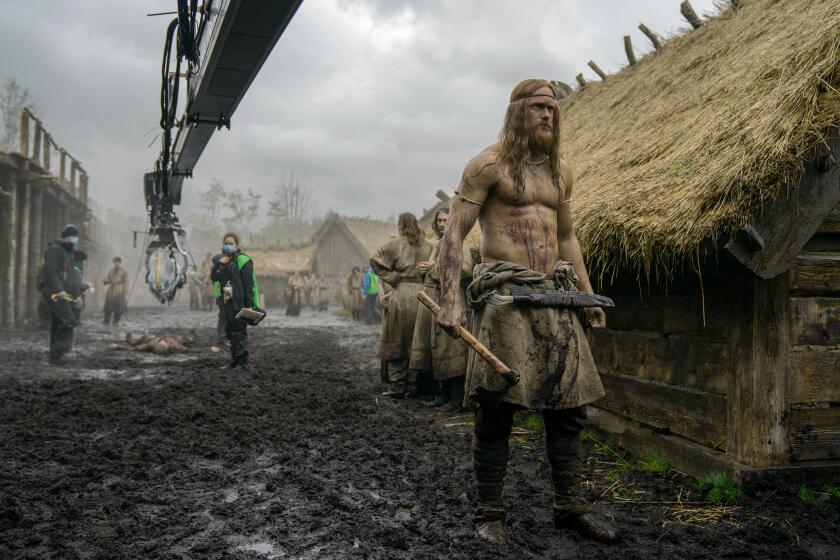Review: Robert Eggers’ mighty Viking epic ‘The Northman’ puts the art before the Norse
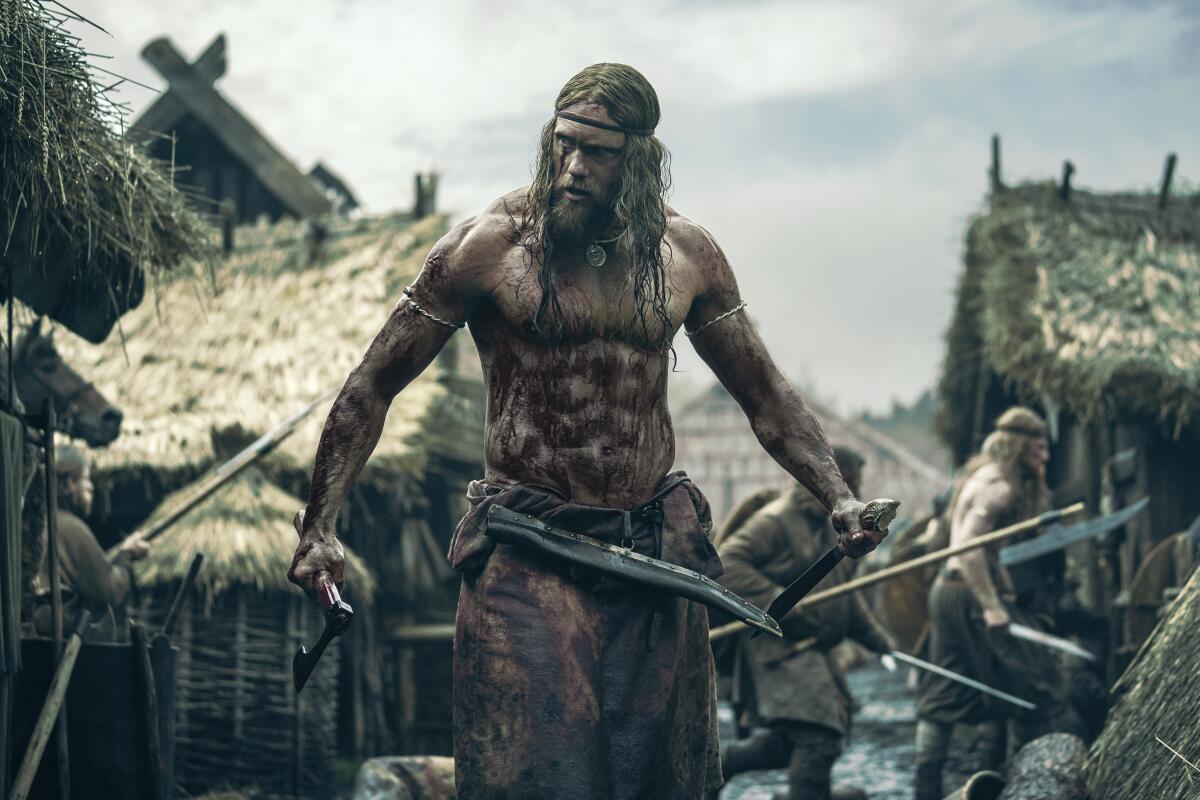
- Share via
Not long into Robert Eggers’ “The Northman,” a mad and mesmerizing song of Iceland and fire, the camera plunges down into darkness, as if it had suddenly been swallowed up by the Earth. It’s AD 895, on a frigid North Atlantic island, and we’re following a scrawny young Viking prince, Amleth (Oscar Novak), and his scraggly bearded father, King Aurvandil (Ethan Hawke), as they descend into a firelit temple, where the royal stripling is led through a muddy, bloody rite of manhood. Amid much growling, howling, floating and farting, Aurvandil predicts his own impending demise and makes Amleth vow to avenge him — an oath sealed in blood and destined to be fulfilled with great geysers of gore and lava.
There are many such grim prophecies and elemental eruptions in “The Northman,” starting with the movie’s arresting opening shot of a volcano belching smoke, fire and voice-over. (I didn’t catch every word, but the volcano might as well be saying, “Behold. Cinema.”) Aurvandil’s fatalistic vision will soon be proved correct: After returning home from distant battlefields, the king is brutally slain by his brother, Fjölnir (Claes Bang, “The Square”). Amleth, having witnessed his uncle’s betrayal, barely escapes alive but vows to return and avenge his father, as promised, and save his mother, Queen Gudrún (Nicole Kidman), whom Fjölnir has taken as his wife. And return he will decades later, now played by a strapping, towering Alexander Skarsgård in full-blown Old Norse berserker mode, who tears into this role like a man — and an actor — seizing hold of his destiny.
For your safety
The Times is committed to reviewing theatrical film releases during the COVID-19 pandemic. Because moviegoing carries risks during this time, we remind readers to follow health and safety guidelines as outlined by the CDC and local health officials.
If you sense some mimicry in this madness, well spotted: The legend of Prince Amleth was the direct inspiration for “Hamlet,” though Skarsgård’s mighty warrior also hails from a cinematic pantheon of vengeance seekers broad enough to include Conan the Barbarian, Maximus and Inigo Montoya. If that makes “The Northman” sound derivative, it is: a witchy brew of Old Norse mythology, Hollywood pageantry and proto-Shakespearean revenge epic.
But Skarsgård (also one of the movie’s producers) has found an ideal collaborator in Eggers, a director sufficiently steeped in film history to know the difference between inspiration and imitation. Like his memorable period freakouts “The Witch” and “The Lighthouse,” though on a vastly more ambitious scale, “The Northman” is both a dazzling display of film craft and a sly retooling of genre, a movie that delights in fulfilling certain conventions while turning others on their artfully severed heads.
Robert Eggers makes his most ambitious film yet with Viking saga ‘The Northman,’ combining historical accuracy with a fantasy mysticism.
And so while it’s clear enough how Amleth’s story will end, the long arc of his journey takes unpredictable, even unsettling turns. When we first meet Skarsgård’s fully grown Amleth, he’s joined a band of murderous marauders, clad in wolf skins as they bring a Slavic village to its knees. Eggers, shooting nearly every scene in fluid, intricately choreographed long takes, gives the action the deliberation and intensity of an ancient ritual. (The sweepingly immersive cinematography is by Jarin Blaschke, the spare, purposeful editing by Louise Ford.) This violence is the way of the world, the movie suggests, and the atrocities we’re witnessing — a burning hut evokes the wartime conflagrations of Elem Klimov’s “Come and See” — are as unexceptional as they are unbearable.
Amleth, courting and thwarting our sympathies at will, is a very strong link in an endless chain of death. (He’s not alone, to judge by an end-credits crawl loaded with names like “Hrólfur Split-Lip” and “Thórfinnr Tooth-Gnasher.”) As Amleth goes on his latest feral rampage, you can’t help but wonder about how many children he’s orphaning and how many spinoff revenge dramas he’s setting in motion.
And Skarsgård, a charmer with an undercurrent of aloofness, is perfectly cast as a warrior so numb to carnage that it takes a supernatural intervention to remind him of his sworn mission: Fjölnir, Amleth learns, has been dethroned and fled with Gudrún and his sons to Iceland. It’s only fitting that this news is delivered by a witchy seeress played by Iceland’s biggest star, Björk, resplendent in oracular blue lighting and a Cher-worthy seashell-ringed headdress.
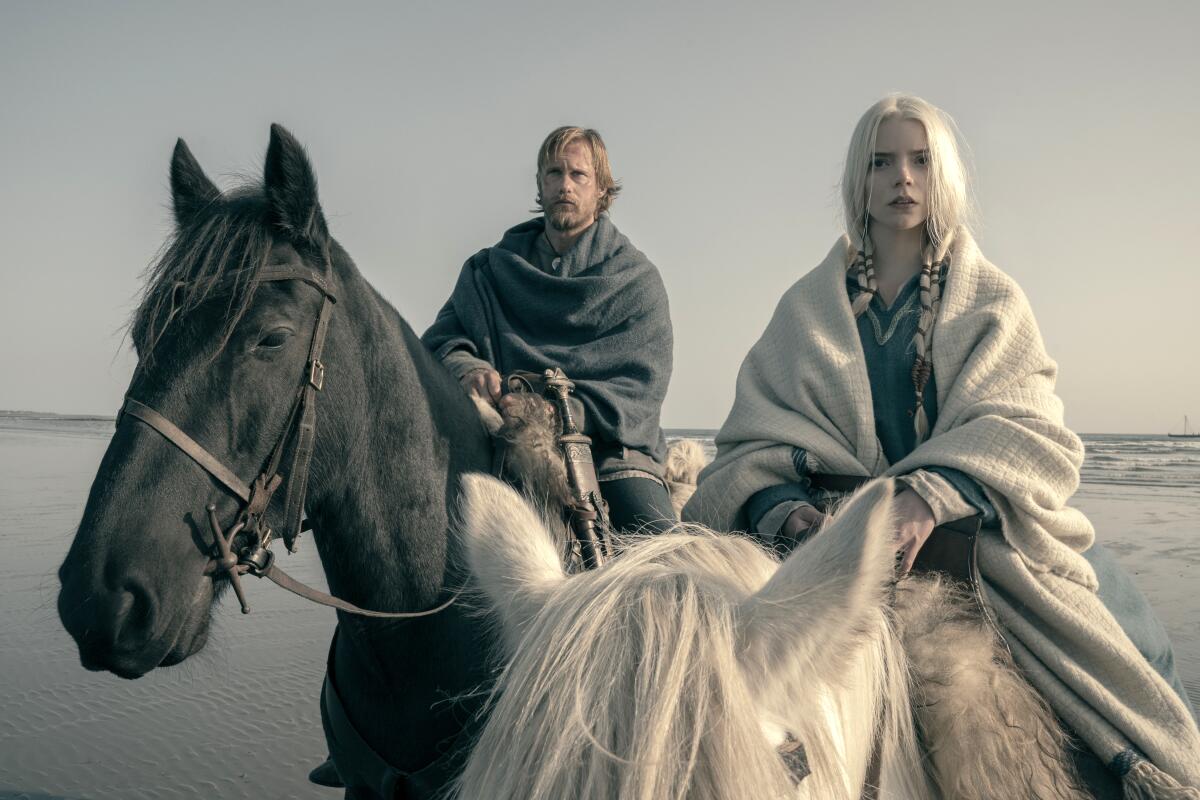
Björk is one of two prominent Icelandic talents pressed into service here. The other is poet and novelist Sjón, who co-wrote the screenplay with Eggers (and who supplied lyrics for Björk’s last major movie, 2000’s “Dancer in the Dark”). Their involvement speaks to Eggers’ characteristic insistence on verisimilitude, born of an obsessive, research-driven approach to filmmaking that might seem persnickety if it weren’t so passionate. A production and costume designer before he turned to directing, Eggers has become our great builder of worlds in extremis: After the spooky Puritan New England of “The Witch” and the lonely maritime outpost of “The Lighthouse,” he once again conjures a nightmarish vision of humanity on the precipice.
But despite the fastidiousness of “The Northman’s” animal-pelts-and-chain-mail aesthetic, the filmmaking feels freer, looser and nuttier this time around — and not just because the spotty visual record of ancient Viking culture leaves plenty to an artist’s imagination. (The director’s splendid regular collaborators include production designer Craig Lathrop and costume designer Linda Muir.) Happily, Eggers makes movies, not research papers, and his sweet spot is that zone where his art-film idiosyncrasies merge with a genuine flair for Hollywood showmanship. Witness the self-consciously florid dialogue, sometimes poetically heightened to the point of torture. Witness too the inspired scenery chewing and quasi-Scandinavian accents indulged by Hawke (gone too soon) and especially Kidman, whose performance as the seemingly demure Gudrún turns out to be one of the movie’s most deliciously barbed surprises.
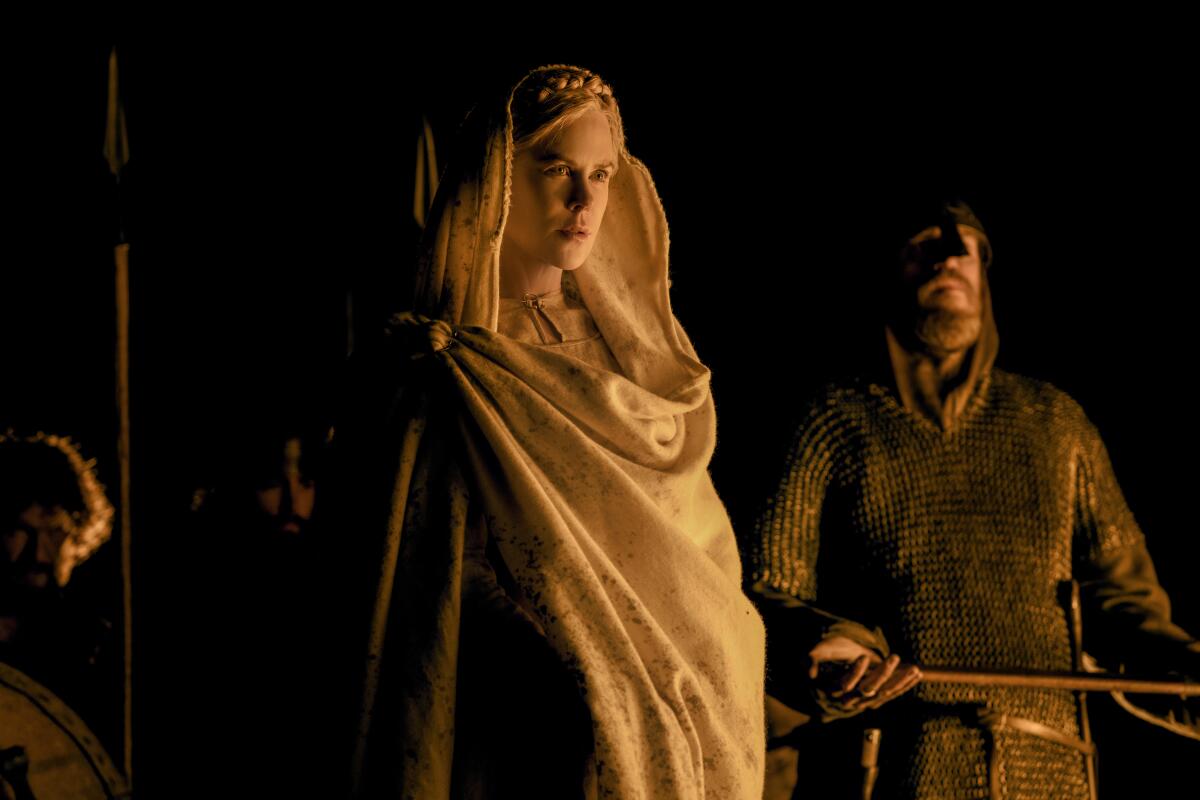
You may recall that Skarsgård and Kidman play a troubled couple in the HBO miniseries “Big Little Lies,” an association that gives Amleth and Gudrún’s eventual scenes together that much more of a feverish Oedipal charge. But Eggers is in no mood to hasten the family reunions and revelations, or to blow his protagonist’s cover. Amleth arrives on Fjölnir’s farm a slave, having stowed away in a boat full of war prisoners, and he’s wily enough to pass himself off for a while as a hard worker and seemingly loyal family servant. He and an enslaved ally, Olga (a fine Anya Taylor-Joy, reteaming with Eggers after “The Witch”), bide their time and share their bodies and secrets, laying the groundwork for a campaign of deadly sabotage against Fjölnir’s household.
Those schemes, when they come to pass, are initially attributed to the work of evil spirits. And while Amleth will eventually take his rightful credit as the author of Fjölnir’s pain, the spirit world — the raw material of the Icelandic myths that are this story’s lifeblood — is of supreme importance here. Eggers, plunging headlong into his material, draws no distinction between fantasy and reality, though as a storyteller, he is naturally inclined toward an ardent defense of paganism in all its forms. Just as “The Witch” critiqued 17th-century Puritan repression with a gleeful embrace of nude bonfire-dancing devilry, so “The Northman,” with its ominous ravens, bearded he-witches and helmeted Valkyries, treats Viking mythology as its own living, breathing, dazzling reality.
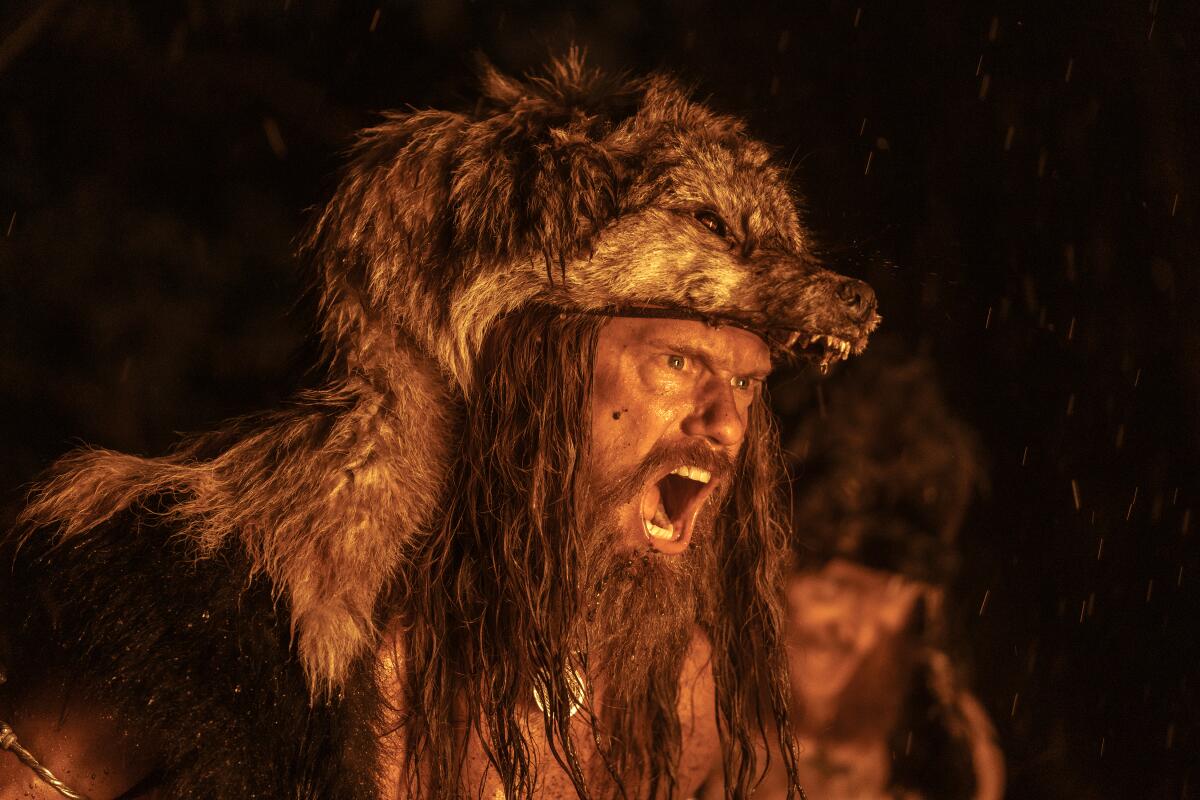
You may find yourself longing for more of that fantasy, perhaps as a distraction from the inexorable death march that Amleth’s journey is destined to become. Eggers, who likes to conjure elaborate visions only to attack their foundations from within, works hard to inflect that journey with a self-critical spirit. There’s a productive tension at the heart of “The Northman,” a tug-of-war between the Hollywood revenge-epic tradition from which it superficially hails and the sharper, more subversive dismantling of simplistic payback fantasies it wants to be.
The final passages are laced with surprises you may or may not see coming, bitter reversals of perspective that complicate — but don’t entirely mitigate — the pleasures of watching a wronged man settle an old score. Bang makes Fjölnir an implacable brute, but not an unsympathetic one. The same is true of Skarsgård, whose career-igniting role on “True Blood,” a vampire with Viking roots and the name of Eric Northman, feels like both a sequel and a warm-up act to this one. Amleth may be no unblemished hero, but with a bulging, blood-caked torso and a willingness to storm the gates of hell, he can still lead you on a trek straight to cinematic Valhalla.
‘The Northman’
Rating: R, for strong bloody violence, some sexual content and nudity
Running time: 2 hours, 20 minutes
Playing: Starts April 22 in general release
More to Read
Only good movies
Get the Indie Focus newsletter, Mark Olsen's weekly guide to the world of cinema.
You may occasionally receive promotional content from the Los Angeles Times.
